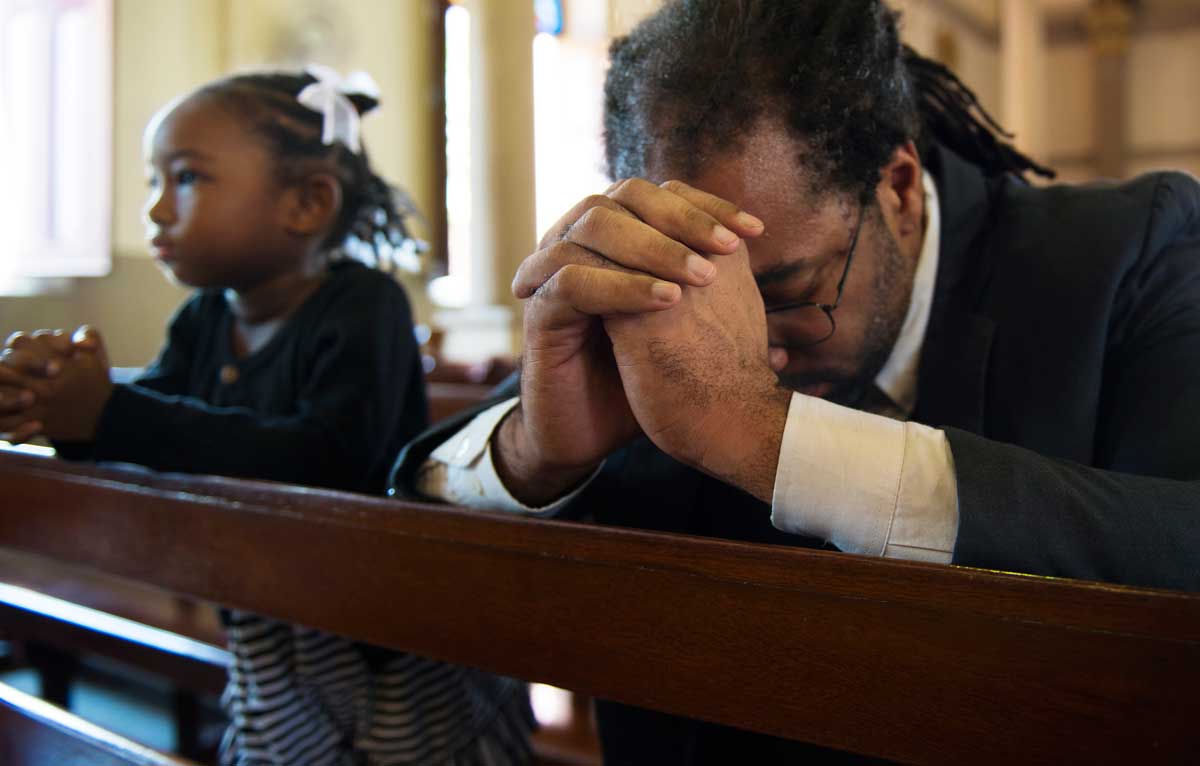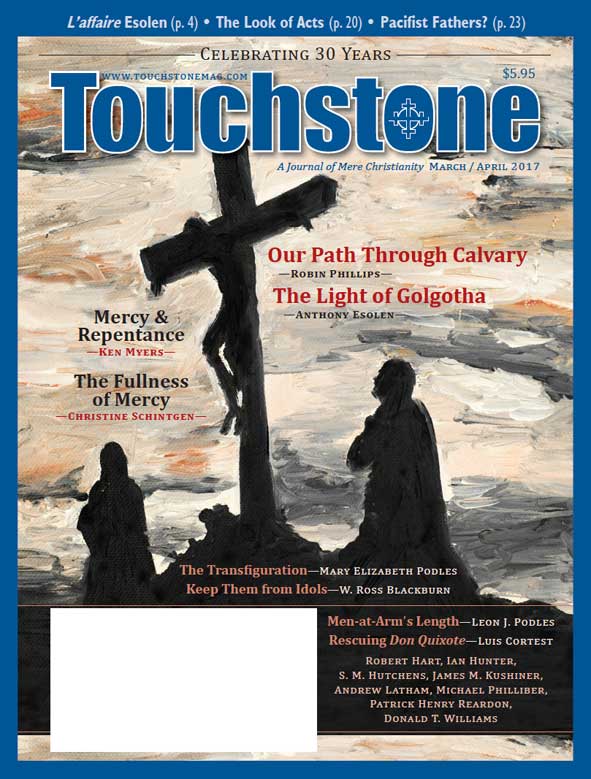Feature
Keep Them
from Idols
The Education of Children Takes Generations of Fidelity
Several years ago I was struck by the first sentence in Eric Metaxas' biography of Dietrich Bonhoeffer, a quote from Eberhard Bethge describing his lifelong friend: "The rich world of his ancestors set the standards for Dietrich Bonhoeffer's own life. It gave him a certainty of judgment and manner that cannot be acquired in a single generation." Given that "certainty of judgment and manner" are increasingly rare, even in the Church, there is something very arresting in Bethge's description of Bonhoeffer. Even more arresting, to my mind, is Bethge's claim that such character can only be forged over generations. Is this true? And if so, how is deep, lasting generational character forged?
The question of character became quickly apparent to my wife and me when our oldest son William was three years old. Having enrolled him in a morning preschool, and in some ways quite a good one, it wasn't long before we noticed a different attitude. William's sunniness was giving way to a contentiousness we had not known. Curious, and a bit troubled, I took a day off from work and accompanied William to school. Things became clear as I observed four-year-old Tommy and marveled at how precisely William had picked up not only Tommy's words and gestures, but also his attitudes. Without complaint to the school (and with best wishes for Tommy), we withdrew William that day, now committed to keeping him at home, at least for his early and most impressionable years. Years later, when William was about nine years old, from a distance I heard him singing hymns while swinging at our neighborhood park. Apparently he hadn't yet learned that you don't do that kind of thing in public.
The Scriptures understand that we are largely a product of our generations, and therefore put great weight on generational faithfulness, particularly passing on the knowledge of God to future generations. This is nowhere clearer than in the Shema of Deuteronomy 6:4–9, perhaps the best-known passage in the Old Testament. In a time when, to borrow Andy Crouch's phrase, the Church is hearing a renewed call to "culture making" as a way of faithfully living out her mission, it is remarkably underappreciated that the home is both the primary place where God intends his people to be formed and the chief means of forging the kind of cultural character that shines brightly in a dark world. With this in mind, we will look carefully at the Shema, exploring not only what it commands about family life, but also the contours of family life it assumes. The passage lays out what we might call a philosophy of education, giving Israel both the content and the context for forming her children, to the end that Israel would live well in the land, and be a faithful witness to the rest of the world.
The Content of the Commandment
The Shema begins as follows:
Hear, O Israel: The Lord our God, the Lord is one. You shall love the Lord your God with all your heart and with all your soul and with all your might. (Deut. 6:4-5)
After asserting the uniqueness of God, the Shema calls for Israel's exclusive love and worship, and that in every area of life, for "all your heart, all your soul, all your might" does not just suggest an intensity of love (be that as it may), but also the all-encompassing nature of love, which influences every area of life. Or, to say it differently, Israel's life is to be lived out in all areas as a practical response to God, who redeemed her and called her to himself. It had a bearing on, among other things, worship, one's economic life, one's sexual relationships, one's understanding of justice, and, as we shall see, the raising of one's children. Even the "success" of one's career was rooted in faithfulness: "you shall remember the Lord your God, for it is he who gives you power to get wealth, that he may confirm his covenant that he swore to your fathers, as it is this day" (Deut. 8:18). Nothing in Israel's life fell outside this command to love God, for all of life was an expression of this primary call.
The corollary to the Shema, the First Commandment, gives the negative side of this command, to reject completely any other gods:
You shall have no other gods before me. You shall not make for yourself a carved image, or any likeness of anything that is in heaven above, or that is on the earth beneath, or that is in the water under the earth. You shall not bow down to them or serve them; for I the Lord your God am a jealous God, visiting the iniquity of the fathers on the children to the third and fourth generation of those who hate me, but showing steadfast love to thousands of those who love me and keep my commandments (Deut. 5:7–10; cf. 7:8–11).
That loving God means rejecting other loves or allegiances, axiomatic in Deuteronomy, is reflected throughout the Scriptures. John puts the matter precisely: "Do not love the world or the things in the world. If anyone loves the world, the love of the Father is not in him. . . . And the world is passing away along with its desires, but whoever does the will of God abides forever" (1 John 2:15–17). James says it even more starkly: "whoever wishes to be a friend of the world makes himself an enemy of God" (James 4:4).
The thrust of the Shema and the First Commandment, then, has both positive and negative implications. Positively, it is a call to love God with all of one's being, thereby ensuring that the love of God orders all other loves, placing them in their proper relationship. The call to love God is also a call to love one's neighbor, implied in Deuteronomy and expressed explicitly by Jesus (Mark 12:28–31) and in the rhetorical question of John: "if anyone has the world's goods and sees his brother in need, yet closes his heart against him, how does God's love abide in him?" (1 John 3:17). Negatively, it is a call to refuse to love the world and its loves, which finds practical expression both in what the Church does and in what she refuses to do.
While the call to break from the world is clear, discerning what is of the world and what is of God is not always self-evident, for we live in a world that exercises its influence in unseen and subtle ways. Paul's call, "do not be conformed to this world, but be transformed by the renewal of your mind" (Rom. 12:2) is necessary precisely because of our tendency to follow reflexively the ways of the world in which we live. The call to the Church, therefore, is necessarily counter-cultural. The only way to be faithful in the world is to be decidedly not of it.
The Context of the Commandment
The above is largely uncontroversial within the Christian community, perhaps in part because it is largely theoretical. We now come to the practical instruction that Deuteronomy gives concerning the education of children. The Shema continues:
And these words that I command you today shall be on your heart. You shall teach them diligently to your children, and shall talk of them when you sit in your house, and when you walk by the way, and when you lie down, and when you rise. You shall bind them as a sign on your hand, and they shall be as frontlets between your eyes. You shall write them on the doorposts of your house and on your gates. (Deut. 6:6–9)
These words are nothing less than a philosophy of education. At least three matters are worth noting. First, the command assumes that education is chiefly about God, in the implication that loving God and following his commands is the most important thing that a child can learn. Second, it establishes the parents as responsible for raising children to love God. Finally, it calls for such an education to be carried on in the course of life. We'll look at these in order.
First, education is chiefly about God. If that sounds strange, it is because we have understood education to be a different endeavor than raising children to know God. Yet Deuteronomy implies that an educated child is not, in the first place, a child who has acquired skills or information, but rather one who knows and loves God. In other words, the goal of education is not simply for a child to know certain things, but rather for him to become a certain kind of person, one who loves God with all his heart, soul, and strength, and therefore is able to recognize and embrace that which is good, beautiful, and true, as expressed in the Scriptures. Learning to know and love God is the ground from which all other knowledge and love is born and judged. As Traherne put it, "Can you be righteous unless you be just in rendering to things their due esteem?" The point is not to diminish the importance of learning a trade or gaining knowledge of the world, but to observe that the primary—one is tempted to say "only"—concern of the Scriptures is that children learn to love God, apart from whom all else is in vain.
The Scriptures testify to this in a myriad of ways. Proverbs, the book most explicitly concerned with the education of the young, begins with the blanket assertion, "The fear of the Lord is the beginning of knowledge; fools despise wisdom and instruction" (Prov. 1:7), making plain that the fear of the Lord is foundational to all further knowledge, and implying that apart from such fear, knowledge becomes foolishness. Jesus said essentially the same thing when he called his disciples to "seek first the kingdom of God and his righteousness, and all these things will be added to you" (Matt. 6:33) and when he gently rebuked Martha, reminding her through Mary's example that "only one thing is needful" (Luke 10:42).
Second, it is the calling of parents to teach their children to love God and his word. The Shema establishes the foundation of this calling—the parents must love God themselves. It is crucial that parents love God because covenant faithfulness, by its very nature, is generational.
Again, the First Commandment is helpful here, particularly its warning that the Lord is "a jealous God, visiting the iniquity of the fathers on the children to the third and fourth generation of those who hate me, but showing steadfast love to thousands of those who love me and keep my commandments" (Deut. 5:7–10). Whatever one's understanding of how this iniquity is visited upon succeeding generations, it is nonetheless clear what attentive parents already know, that the sins of the parents pass down to the children. As does righteousness. It is difficult to underestimate the power of a parent's example in the life of a child.
Thus, the parents' faith is of paramount importance, for there is neither promise nor encouragement that unfaithful parents will raise faithful children. So understood, Joshua's commitment reveals a certain precision: "as for me and my house, we will serve the Lord" (Josh. 24:15). If Joshua does not personally serve the Lord ("as for me"), there is no reason to suppose that his household will, either. It will not do to have the form of godliness while denying its power, for, as we know, it is quite common for a child to turn away from the faith by citing the hypocrisy of his parents. On the other hand, the Scriptures give great confidence to parents who love God: "Blessed is the man who fears the Lord, who greatly delights in his commandments! His offspring will be mighty in the land; the generation of the upright will be blessed" (Ps. 112:1–2).
The calling of parents to teach their children is consistent with a child's normal desire to spend time with his parents. Like many, I was deeply instructed when I heard of the simultaneous journal entries of Charles Francis Adams (grandson of John Adams and son of John Quincy Adams) and his son. Referring to the same fishing trip, Adams wrote, "Went fishing with my son today—a day wasted," while his son wrote, "Went fishing with my father—the most wonderful day of my life." It is perhaps not unlike a recent experience I had with my 11-year-old son Joseph. Working with him on his spelling, I took him on an errand in which we were an hour in the car, and I spent the whole time quizzing him on different words and explaining different parts of speech. Upon returning him home, he cheerfully said, "Thanks, Dad. I had a great time!" The desire a child has for his mother and father lends peculiar power to their instruction.
Finally, the Shema gives practical form to education, to be carried out in the sitting and the walking and the rising and the lying down. It is perhaps of little importance whether the command speaks prescriptively, calling for parents to teach their children in the course of life, or descriptively, assuming life lived together and therefore calling for the Scriptures to be discussed during that time. The implication is the same: teaching the word and the ways of God is carried forth in the course of life. We should not be surprised that the Scriptures speak this way, for if loving God finds practical expression in all of life, it follows that children would be taught to love God practically in all of life.
Furthermore, the expectation that parents will interact with their children at this level is entirely consistent with the powerful influence that parents have in the lives of their children, for good or for ill. The all-encompassing means of teaching the Scriptures is called for not just because such concentration and consistency provide the best way to learn the Scriptures, but because they provide the best way to learn anything. It is the best way to learn of God. And it is the best way to learn of not-God.
The Practical Effect
Here we come to some practical observations. To reiterate, the modern church largely has assumed that education is something distinct from growing in the knowledge of God, or that one's Christian formation and one's education are, generally speaking, different things. When that kind of dichotomy takes hold, it becomes natural to assume that religious education can take place in one arena, and other education in another.
Deeply embedded in our culture's understanding of education is the notion that it should be value-neutral, meaning without reference to God. The practical, if at times unintended, effect of this notion is to proceed with education as if God does not exist. In other words, in refusing to begin with the premise "God," modern education proceeds from the premise "not-God," a premise axiomatic in our public, and much private, education. To see this, one need only recognize that teaching, "In the beginning, God created the heavens and the earth" is forbidden, while the equally radical notion that God did not create the heavens and the earth is taught as scientific truth.
The problem with a not-God premise is not chiefly that public institutions refuse to teach the Scriptures. It is not even that our children are subjected to the confusion brought about by agendas such as "comprehensive sex education" (mandated in the Healthy Youth Act in my own state of North Carolina in 2009) or transgender bathrooms, which teach volumes about who we are and what it means (or does not mean) to be male and female. Most basically, a not-God premise means that state schools teach, if only implicitly, that God is irrelevant to education. The idea that God has anything to do with the natural world, or historical movements, or mathematics, is effectively sidelined in the name of "neutrality."
Yet this supposed neutrality is in fact a very bold statement that it is possible—even appropriate—to understand the world apart from God. In other words, underneath such a philosophy is a sturdy metaphysical commitment that is just as "religious" as any religious perspective it might seek to sideline. In effect, the prevailing philosophy of education has institutionalized Psalm 14:1: "The fool says in his heart, 'There is no God.'"
The problem is not simply theoretical. Students really do learn to view the world apart from God. The language of values, pervasive even in Christian circles, is a good example of this. "Values" is not the language of right and wrong and good and evil, but of preferences. And yet we apply this word to issues that are at root profoundly moral, such as sex, abortion, racism, practical generosity, and notions of civic responsibility.
Most foundationally, students learn to view themselves apart from God. For instance, in the not-God system grounded in Darwinian evolution, human beings are not understood to be categorically different from animals, but only to be further along an indeterminate evolutionary trajectory. And that has profound implications for how we treat one another. If my neighbor is the image of God, that suggests one thing. If he is just another animal, that suggests something else entirely.
One of the things that religions do—even the chief thing they do—is to tell us who we are. Leaving no basis whatsoever for speaking of right and wrong, we are left with only values, or preferences. Even apart from Darwinism, teaching about the world while explicitly and intentionally avoiding the One who created and has purposes for the world has the effect of teaching that God is irrelevant. And children are learning.
And why do they learn this? Because, generally, children are at school when they sit and walk and lie down and rise. When the context of the home is replaced by the school, the content of what is being taught will be absorbed accordingly. The context of education is not irrelevant to education, and the atmosphere in which children spend their time (they are always learning) may very well override what their parents might teach. Lesslie
Newbigin, with typical clarity, makes this very point:
Even in homes where the parents are committed Christians, it is hard, to the point of impossibility, for children to sustain belief in the meta-narrative of the Bible over against that understanding of the meta-narrative—the picture of the origins and development of nature, of human society as a whole—which is being offered to them at school. It is possible to maintain the telling of the biblical story in the privacy of home and church, but in so far as this story contradicts the meta-narrative of the schools, young people are placed in an impossible situation. . . . A belief which is permitted only to exist in a bunker may survive for a time, but it must finally be obliterated. (Lesslie Newbigin et al., Faith and Power [Wipf and Stock, 1998], 158–159)
The extent to which any educational system is built upon the premise of not-God, whether explicitly or implicitly, is the extent to which that educational system has become idolatrous. And it is so by definition. Which brings us back to the First Commandment. What does "You shall not bow down to them or serve them; for I the Lord your God am a jealous God" mean for the Christian Church in the arena of education? What is the practical form of forsaking idols as a necessary expression of loving God?
A Revealing Comment
Earlier this year on a political commentary website, I heard the following comment in response to the dissolution of the family in the U.S., and the consequent effects on raising children:
I think there are all sorts of traditional, social ways of taking care of kids, and of taking care of your parents, and as those things evaporate the real problem is we are not yet efficiently replacing them with state-based solutions. (bloomberg.com/news/videos/2015-02-23/the-global-flight-from-the-family-eberstadt)
The comment is revealing, for it locates the problem not in the dissolution of families, but rather in the lack of state-based alternatives, clearly implying that the family is irrelevant as long as the state picks up the responsibility of raising and educating children. While obviously the words of one commentator, the Church does well to pay attention here, for our culture is moving decidedly in the direction of offering our children to the state. Political initiatives such as universal publicly funded pre-school make clear that there are many in our world who believe the state should take the lead in raising children, and who have the political power to see it done.
Final Suggestions
Let me conclude with several suggestions:
• Countercultural Call: First, let us take seriously that the call to love God is countercultural, sometimes even in the Church. Loving God should be practically discernible, positively and negatively, in the life of the Church, and in the families within the Church. It is important to note that the call to love God and forsake idols was given to Israel, and that those warned not to hate the Lord in the First Commandment were Israelites. In other words, implicit in the commandment is the understanding given later in Paul that "not all who are descended from Israel belong to Israel" (Rom. 9:6). In the effort to discern and forsake idolatries, Christians will sometimes make decisions that are at odds not just with their culture, but with their church.
Paul's exhortation not to be conformed to the world, but that we be transformed by the renewal of our minds is particularly important, and worth revisiting here. Paul's words reflect the power of the cultural climates, and the tendency for our thinking to conform to those climates. We do well to ask the question: do our decisions concerning the education of our children conform to the Scriptures, with an eye to shaping the character of our children as lovers and servants of God, or do they conform to the educational philosophies of our culture and its systems of education? The dichotomy between what we call secular and religious learning is powerful, as is the notion that education should somehow be religiously neutral. These philosophies are pervasive, and easily internalized. And they will not be dealt with passively.
• Parents as Prime Educators: Second, let us recognize the home as the primary context of education, and the call of parents to educate and disciple their children. Education is far more than imparting information. It is chiefly about forming Christian character and judgment, teaching children to love God in all of life. Yet much of our current practice, allowing secular education to be undertaken by the schools and religious education by Sunday schools or youth groups, in effect suggests that education is best carried out by experts that can impart secular or religious information. The effect is to sideline parents, who are often deeply involved in neither.
Perhaps the Church serves her people best not by reflexively taking charge of opportunities for education and discipleship, but rather by using her resources to encourage and enable parents to do that, insofar as they are able. Given that certain philosophies of education have become deeply entrenched in our culture, this is no small matter. How to work this out practically, since public school appears to be the only option for many, particularly single-parent families, is something that needs to be approached creatively, and by the whole Church. But it must be done. As Bonhoeffer wrote, "If you board the wrong train, it is no use running along the corridor in the opposite direction."
Is the foregoing an argument for homeschooling? I am tempted to say so, but don't want to push that far. As the parable of the talents (Matt. 25:14–30) suggests, God is not a micromanager, and I don't assume one thing works for everyone. Furthermore, not all schools are alike, and not all people have real choices in the matter. Indeed, in the midst of a rich education at home, Bonhoeffer himself attended a local school.
However, I would make several comments. Homeschooling can mean different things, and there is great diversity under the homeschooling umbrella. For my own children, the older they get, the more they learn outside the home, and from people we trust in our community. As a father who keeps his children home, and who often takes his children with him, I am also aware that it is entirely possible to "homeschool" and miss the spirit and the call of the Shema, opting instead to transfer the forms and content of a secular education to the home.
Yet I do think that we need to reorient our thinking in this direction. Several years ago, a clergyman friend of mine told me that homeschooling is a very special calling, one to which not everyone is called. While I concur that not all are called to homeschooling, I would suggest that the norm runs in the other direction, that the Scriptures suggest that teaching children at home is far more normal. Sending children away to school, particularly one that teaches without reference to God, is a very special calling, and therefore to be undertaken cautiously and carefully. Parents who send their children away to be taught by people they don't know, to be taught subjects they have not chosen in a manner they don't know, to be involved with friends they don't know, and perhaps to be involved in activities they don't know, should not be surprised when their children follow the ways of the world in which they have been immersed and from which they have learned. Recognizing such constitutes a call upon the Church to encourage us to open our homes, communities, and other resources to give real alternatives to those who don't have other options.
• Centrality of the Cross: Third, let us remember that teaching children to love God means that education is firmly grounded in the cross of Christ. Why this is so is well encapsulated in 1 John:
Beloved, let us love one another, for love is from God, and whoever loves has been born of God and knows God. Anyone who does not love does not know God, because God is love. In this the love of God was made manifest among us, that God sent his only Son into the world, so that we might live through him. In this is love, not that we have loved God but that he loved us and sent his Son to be the propitiation for our sins. Beloved, if God so loved us, we also ought to love one another. No one has ever seen God; if we love one another, God abides in us and his love is perfected in us (1 John 4:7–12).
Why is the cross of Christ so crucial? The cross reveals God most completely. We only love God insofar as we know who he has revealed himself to be in Christ and what he has done for us in Christ. Correspondingly, because man is made in the image of God, it follows we cannot know ourselves apart from knowing God, and it is folly to seek to understand the nature and movements of man if we don't know who man is. Man is not only the image of God, but as Christ is the most complete revelation of God, man is the image of Christ. And he is therefore the image of Christ crucified. The call to Jesus' disciples, therefore, is to "love one another, as I have loved you" (John 13:34). And what is the purpose of education, if not to love God and learn to serve one another because we love him? In this light, consider the words of Micah: "He has told you, O man, what is good; and what does the Lord require of you but to do justice, and to love kindness, and to walk humbly with your God?" (6:8).
Moreover, the cross makes us humble, ensuring that our boasting is not in ourselves, but in God alone. We do not seek to raise "moral" children, or to inculcate "Christian values" (both of which can lead to insufferable pride), but rather children—who will become adults—who love God and their neighbors. When this is the case, whatever subjects and areas we study—math, science, literature, a trade—will be studied to their right end, to glorify God by exploring his creation and acquiring skills by which to serve him, our neighbors, and the world.
• Family & Witness: Finally, we need to see the connection between the family and the witness of the Church. As evident throughout the Scriptures, the witness of the Church is chiefly manifest in her presence, even before her proclamation, for the witness of God's people rests on who we are before what we do. Israel's missionary calling, to witness to the nations as a kingdom of priests and a holy nation, depended upon her obedience to the word of the Lord. The means by which Israel received this word was intended to be from the parents, and particularly the fathers, who taught their children to love God and keep his commandments, as they sat in their homes or walked in the way or rose in the morning or went to bed at night. To the extent that this was done faithfully, Israel would truly be unique, a culture that was visibly distinct from the surrounding world that did not know God.
Likewise for the Church. Jesus' call to the disciples to be a city set on a hill and a light that would cause the world to see their good works and glorify their heavenly Father is precisely the same vision. A city set on a hill is a city that is different, different because it knows and loves her God. And the means by which she knows her God is the same, through parents who love God and who teach their children to love God as well. This is the foundation of culture-making, and the source of its power. Cultures rooted in the love of God, whose children grow into those who exhibit "certainty of judgment and manner," will shine very brightly indeed, especially as the surrounding culture grows darker and more uncertain. •
W. Ross Blackburn is the rector of Christ the King, an Anglican Fellowship in Boone, North Carolina. He also writes weekly reflections for the Human Life Review's website on matters of life.
subscription options
Order
Print/Online Subscription

Get six issues (one year) of Touchstone PLUS full online access including pdf downloads for only $39.95. That's only $3.34 per month!
Order
Online Only
Subscription

Get a one-year full-access subscription to the Touchstone online archives for only $19.95. That's only $1.66 per month!
bulk subscriptions
Order Touchstone subscriptions in bulk and save $10 per sub! Each subscription includes 6 issues of Touchstone plus full online access to touchstonemag.com—including archives, videos, and pdf downloads of recent issues for only $29.95 each! Great for churches or study groups.
Transactions will be processed on a secure server.
more on fatherhood from the online archives

14.1—January/February 2001
The Christian Heart of Fatherhood
The Place of Marriage, Authority & Service in the Recovery of Fatherhood by John M. Haas
more from the online archives
calling all readers
Please Donate
"There are magazines worth reading but few worth saving . . . Touchstone is just such a magazine."
—Alice von Hildebrand
"Here we do not concede one square millimeter of territory to falsehood, folly, contemporary sentimentality, or fashion. We speak the truth, and let God be our judge. . . . Touchstone is the one committedly Christian conservative journal."
—Anthony Esolen, Touchstone senior editor












